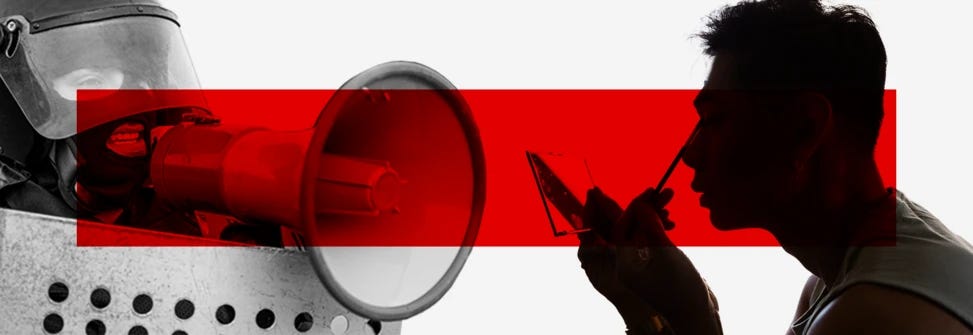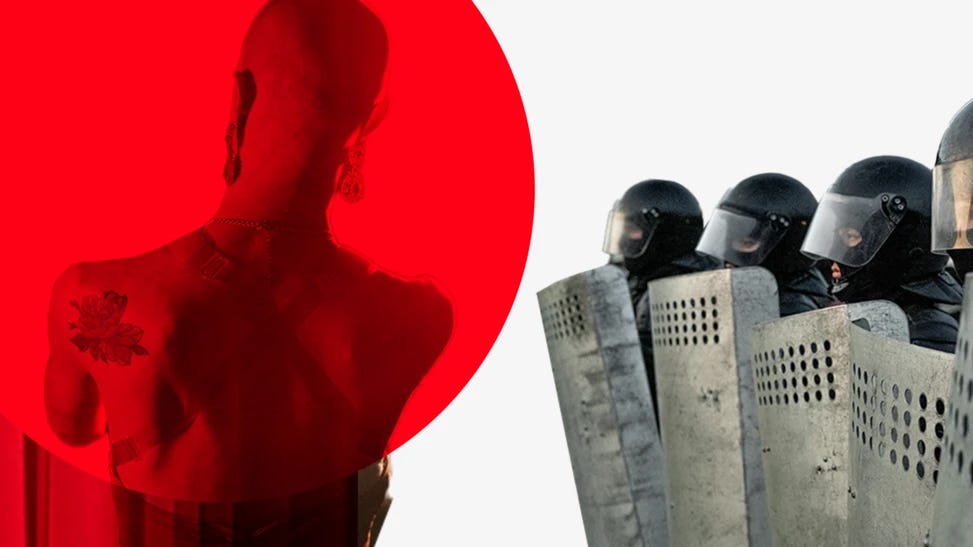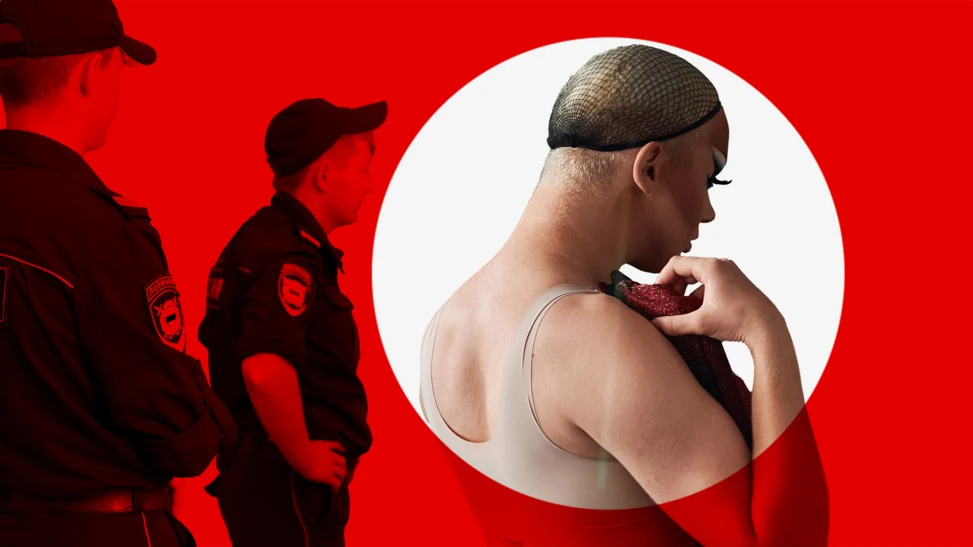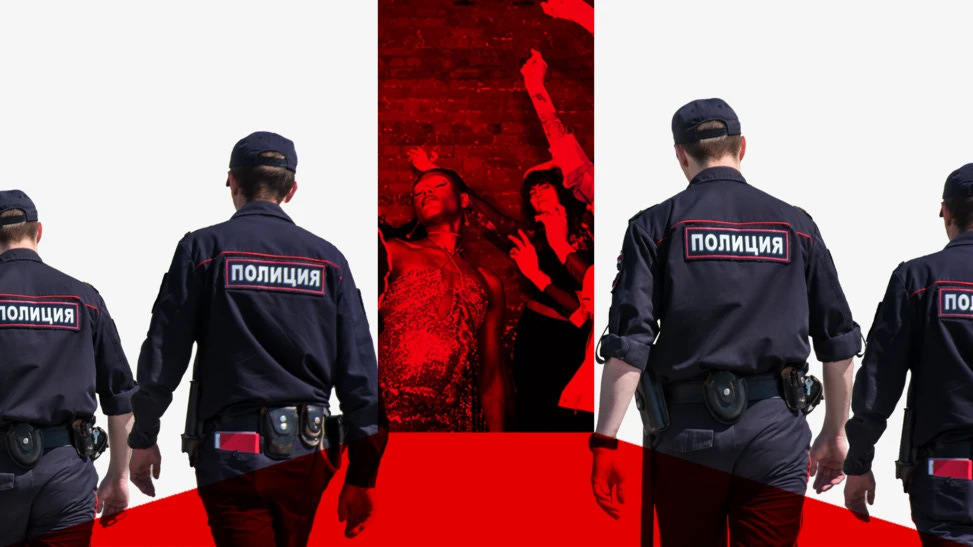No gays. No drag-queens: How Russia's club scene has changed since the start of the war in Ukraine
Russian police are raiding gay clubs and parties, with venues distancing from LGBT identities and facing pressure to survive amidst government crackdowns.
By Anastasia Golubeva.
The morning after Halloween, Kirill walked out of a police cell into the biting cold of Yaroslavl, wearing just a dress and high heels. He had not a rouble on him, nor a phone to order a cab.
Kirill*, a professional drag queen, had travelled three hours from Moscow to perform at a farewell night thrown by the town’s gay club before it planned to shut down. The OMON police special forces decided to crash the party. While another drag artist sang legendary rock band Leningrad’s lyrics, “You’re beautiful, like Jesus”, cops burst into the club and began shoving people’s faces to the floor.
They rounded up the performers and organisers, taking them to the police station and refusing to let them take off their makeup or change into everyday clothes. The cops kept them there until 9am, interrogating them and searching through their phones. They wanted to know “where we studied, where we worked, what we were doing in ‘women’s’ dresses,” Kirill said.
A month later, a judge fined Kirill 50,000 roubles ($500) in a hearing that took just 15 minutes. The BBC had arranged to speak to him again, but he deleted his Telegram account after the ruling.
In some ways, Kirill was lucky not to face criminal charges. Since the Supreme Court banned the “global LGBT movement” last year, owners and employees of gay clubs in four different Russian cities have been prosecuted. This has happened despite the fact that no such organisation exists. Now, the security forces view the very existence of gay bars as illegal, says Yevgeny Smirnov, a lawyer with the human rights group Department One.
The public seems to be actively fueling at least some of the raids. On at least two occasions, in Orenburg and Chita, members of the nationalist movement Russian Community (Russkaya Obshchina) took part in the searches alongside security forces, while in Kirov a local publication has been regularly writing about the local LGBT club.
The first “LGBT extremism” case began in March with a police raid on Pose, a club in Orenburg, near Russia’s border with Kazakhstan. The club’s owner was charged and sent to a detention centre [CK] before being allowed out on house arrest in the summer, as he awaits trial. Then, this autumn, club owners and event organisers were charged in Chita, Kirov and Voronezh.
“You’re now just a club”
Many clubs have made dramatic changes to avoid being targeted. One spot in a central Russian city has actively stopped calling itself a gay club. They got rid of all their LGBT symbols and BDSM gear, took pictures off the walls and knocked down the dark rooms that are used for privacy.
The only thing that remained was the drag show. “Nominally, it’s now a parody show – a work of theatre,” says Oleg, an employee of the bar.
But after a recent raid, the club’s management decided it was no longer safe even for drag queens to keep performing there, so they suggested that artists dress up as men, rather than women. “The people who used to wear dresses and put on makeup now draw on beards and perform as hyper-masculine men,” said Mikhail, another employee.
Many clubs across Russia have used these tactics to avoid closing, says Alexander Viltonov, who worked in the Moscow club scene for many years. For example, one club in a city of more than a million people changed its name, hired female artists and only let men perform dressed as other men or in freak outfits. Across Russia, artists who once performed as Lady Gaga now do parodies of popular Russian crooners like Valery Meladze and Philipp Kirkorov, Viltonov said.
In the bar where Oleg works, the decision to remove anything incriminating has paid off.
One night in October, police officers stormed inside and began throwing people to the ground and taking photos of their documents. One cop started searching for the dark rooms. “Where do people ****?” (have sex) he shouted, according to Mikhail.
The police let all the women leave the club and then allowed film crews inside. “They did that to create the impression that it was only guys in there,” said Oleg, another employee.
But the cameras didn’t find anything unusual – a few videos and photos appeared on Telegram, just of scared men in a club. By the end of the raid, employees say the police were upset at having found nothing – no LGBT flags and no drugs. The evening’s shows hadn’t started yet, so the drag artists who were set to perform weren’t in their outfits, Oleg said. The cops “were crazily angry that we had a whole crowd of women in the club and kept asking, ‘Where are the **** (gays)?’ I said, ‘Why did you think there would be gays here?”
They even tried to get the security guard to help, asking if gay guys came there, Oleg said. “He answered by asking how he was supposed to know whether a guy was gay or not just by looking at him.”
The cops took all the club’s employees to the police station, but didn’t ask any detailed questions, Mikhail said. “In my interrogation one cop turned on the other and asked, ‘Why are you asking so little? Did we round them up and bring them here just for that?’” Mikhail said. “Then they made us unblock our phones and they took photos of a couple of things but we’d already wiped all work conversations off them.”
The club’s employees were ultimately let go without incident – a few were fined just for swearing or smoking. “They didn’t know what to do with us in the end,” Oleg said. “We had to write an explanation on a little piece of paper that has no legal meaning. I’m sure they threw them straight in the bin.”
But some clubs have gone further than Oleg’s employer, said Viltonov, stopping acting as gay bars altogether and making specific deals with the security services to save their businesses. “They leave your club, your business, alone and you take your sexual orientation elsewhere and stop presenting yourself as a gay club. You’re now just a club,” he says.
Others play with nationalist themes to show “we’re doing everything correctly”, Viltonov said, performing patriotic songs like “Mother Earth” (Matushka Zemlya) and even parodying nationalist singer and fiercely pro-war propagandist Shaman.
“Everything went dark”
Unsurprisingly, customers and drag artists are unhappy with the new approach, Oleg, Mikhail and Viltonov say. The number of people going to clubs keeps dropping as more and more news stories circulate about raids.
“It’s unclear how we can get people to come here now, because everyone used to go for the atmosphere, the funny drag queens and musical numbers,” Mikhail said. “Now we’ve shut our main room because there are so few people and what’s the point in opening it?”
The drag profession is now dying, “finished off” by the raids, Oleg says. Some of the best artists have left Russia, while other famous queens have refused to perform dressed as men, he said. The artists who do keep performing often come just before their performance begins and leave straight after. “These people have been performing for more than ten years, developing as artists. It was their job and then everything went dark in just a moment,” Oleg said.
Drag queens who stayed in Russia were forced to shut down or clean up their social media and now say they’re not drag queens but “artists of an original genre, actors or impressionists,” Viltonov says. Many have stopped performing at all – especially since the raid on a club in Voronezh where news reports said one of Russia’s most famous drag artists, Zaza Napoli, was performing.
But some keep performing and taking risks, since it’s their main means of income. Club owners are also taking the same chance, hoping that security forces won’t come for them and that they can keep their bars open. “The drag world is totally run on enthusiasm. Clubs don’t buy outfits, wigs and props for the artists. They do it out of their own pockets, and many performers who have been fined, have no way to pay,” he said.
Viltonov himself has decided to stop going to gay bars altogether. “I realised I don’t want to put my life at risk, lying face-down on the floor and being subjected to security forces’ violence. It psychologically broke me,” he said. “Not just the police, but nationalists, can descend on any club.”
“Everyone used to shout that they didn’t care what we were doing, as long as we were doing it behind closed doors,” says Oleg. “But now we’re not even allowed to exist behind those closed doors.”
“Our clubs used to be an island of safety, joy, a night of eternal carnival. Now there’s just melancholy,” Mikhail said.
Proving membership of a non-existent organisation
Little is known about the ongoing criminal cases, because none have yet come to court. The names of the defendants aren’t public and, apart from the news about cases being opened, there’s basically no information on them.
The authorities will have to prove that “the central nature of the actions was in line with the paradigm that the Supreme Court thought up,” says Stanislav Seleznev. “Obviously, no such centralised LGBT organisation exists. For now, no one, apart from the Justice Ministry employee who wrote the petition to the Supreme Court, has seen this secret organisation.”
The court’s decision, made in November last year, says the LGBT movement “propagandises the ideology of breaking traditional values”. The court acknowledged that the “movement” in Russia is “decentralised” but said organisations and individual activists are leaders of “cells”.
Seleznev believes that the authorities don’t know how to deal with “LGBT extremism” cases since they’re about “non-existent organisations”, they can’t prove membership by following the same templates used when targeting the Jehovah’s Witnesses or Navalny’s team. As prosecutors and courts like to base their work on precedents, the investigations and trials are unlikely to proceed quickly until there’s a “model case” they can follow, he said.
There have been at least 12 raids of LGBT clubs since the Supreme Court’s decision but there’s little rhyme or reason as to how people are punished – with some facing criminal charges and others, like Kirill, fined for “LGBT propaganda”.
“The same action might face criminal charges in Orenburg but administrative ones in Kursk. The way the law is formulated means it’s impossible to figure out the limits of what’s allowed,” said Smirnov.
There have been at least 20 prosecutions for LGBT propaganda, the BBC has found using data from the independent news site OVD Info.
The cases vary wildly.
Sometimes, the security services will crack down on private parties – such as one where a teenager is filmed wearing lipstick, or a video of a birthday party 14 years ago where a woman kisses the birthday girl on the lips. In others, people have been targeted for kissing in public or for publicly posing for photographs as a couple.
Fines have separately been handed out for the use of an “extremist symbol”: the rainbow flag. The Sova Center, which carries out research on extremism and xenophobia in Russia, has found 36 such cases, mostly where people have been fined for sharing rainbow images online. Smirnov says the Interior Ministry and FSB use a special programme to search for it online – which may explain a curious case that saw police draw up a report on a protestant minister who, six years ago, posted quotes from the Bible about how homosexuality is a sin along with a picture of the rainbow flag and the title “Let’s talk about homosexuality”.
While those cases have focused on the rainbow flag so far, Smirnov believes the authorities may ramp up their interventions using the anti-Navalny playbook, which saw even the letter “N” dubbed an extremist symbol. “We can’t rule out that things could end up like that in the future,” he said.
But as LGBT institutions across Russia buckle in the face of harsher and harsher crackdowns, a few holdouts remain. Mikhail has kept working at the gay club even after the raid, continuing on as a “silent protest and citizen’s act”.
“I’m staying to work here as long as I can,” Mikhail added. “I want to help people like me who want somewhere to have fun, and to feel human.”
*These interviewees’ names have been changed for the sake of their safety
Read this story in Russian here.
English version edited by Max de Haldevang.







The best option for anyone who is a “minority” in todays Russia is to make a plan to leave the country, and get out as soon as possible.
I felt sorry for the affected. I find intolerance of any minority whose life choices whether it be religious, life styles, sexuality etc rather pathetic. Thank God l live in Britain where tolerance is an accepted societal value. Unlike Russia where the illiberal loonies have escaped and use their backward ‘traditional values’ like some form of badge of pride. Pathetic.